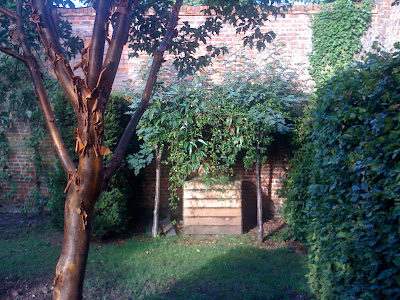I like Saturday Live on BBC Radio 4: always interesting conversations with interesting people. This Saturday, in the midst of all this interestingness, one phrase really resonated.
“We've all got that little bit of magic, that stays with you all your life ... a place of inner calm and happiness", said actor Charles Collingwood (Brian Aldridge in The Archers).
I hope its true that everyone has such a place. It is true for me, and it's this place.
Nothing remarkable in this view you might think, and you would be right, but for me it embodies thirty seconds that have shaped my entire life.
I was five years old, and had just finished my bath. My father wrapped me in a towel and lifted me to a chair beside the bathtub, so he could dry me.
I looked at my small brown hands gripping the wooden chair back, and then up my father and then through the open window, where I saw approximately what you see in the picture.
It was a summer evening, so the sun was slanting in from the left, full onto the Down. (Middle English “Doun”: a hill. Similar to the modern “dune”, as in sand-dune. A rounded, chalky, mainly treeless hill in southern England).
It must have been a weekend, (a) because my father was bathing me, and (b) because that is the village cricket field in the foreground, and there was a game going on, with long evening shadows cast by the pavilion and the players, the bang of bat on ball, and gentle cheers and clapping every now and then, as a run or two was scored. Beyond the field I could see the wooded dip where the little river ran, the low, flinty, grey village school on the hillside, and the ancient hollow in the flank of the Down, which we called “the vineyard”, a sun-trap where the Romans used to cultivate their vines, so we heard.
I knew that hill well. Sometimes we took our jam sandwiches, wrapped in greaseproof paper, and climbed to the top for the wonderful view back over the valley and our house. It was a hard, steep, tussocky climb for little legs, up through the shady churchyard and onto the wide open hill, under the sky and song of the skylarks. The sun was always burning hot up there, so my memory goes.
Sometimes we didn’t make it to the top, and sat in a row on one of the little paths worn by centuries of grazing sheep, like contours, almost like steps, into the side of the hill, with our plimsoled feet resting on the path below, the backs of our bare legs scratched by the grasses. Close to the ground, we could hear the summer insects buzzing among the thick, sheep-cropped chalkland plants, full of little flowers miniaturized by all those eons of nibbling. In the time-honoured way, we could lie on our backs and gaze upwards, trying to see the skylarks, or roll over and peer into the tiny, shady, busy world among the grasses.
Looking up, we could see clear across the village below, the beloved stream running through it and the green fields and hedgerows all around, to another row of Downs to the south of us, with great Butser Hill like a rampart to the east. Sometimes, shading our eyes with our hands, elbows on knees, we could see the glittery sea far, far in the distance. Sometimes an ancient green bus trundled with glinting roof along the dusty road by the edge of the hill, and stopped right outside the school below us, on its way to Petersfield, where I was born.
All this I knew about the hill, in the moment that I looked at it in the evening sunlight, and heard the gentle cricket sounds below, and laughed at my father's silly jokes as he quickly dried me.
Standing on my chair in the cool, blue bathroom, I remember that a swallow swooped over the field, from the direction of the hill, and into her nest just above me, under the eaves of our house.
But what I remember most is that I was bursting with happiness to be with my father, and, very best of all, I knew that he was happy too, as he carried me smiling into the bedroom I shared with Andrew, age four, for a bedtime story.
And ever since then I have loved the Downs, the "sunlit uplands" of churchillian fame, and quiet summer evenings when the air-pressure is high and the swallows are swooping, living their lives. I have loved looking outward through windows: I have found that an outlook, a view, is necessary to me.
Many people love these things of course, but for me they are the frame of security itself. They take me to my own foundations.
And how extraordinary is the elasticity of time and place when it comes to the emotions! Those thirty seconds encompassed me, my father, the Down, its life and its place in my life: they lasted half a minute, and a whole lifetime. Sheer magic!







































